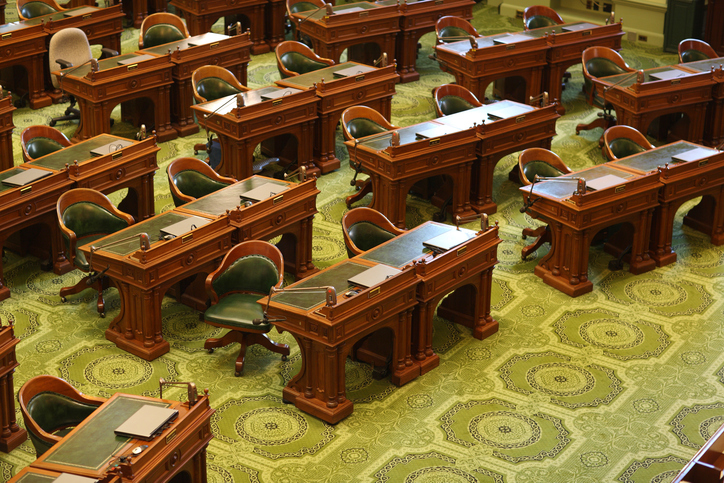The California Legislature conducts most of its business during regular two-year sessions that begin in early December of even-numbered years. For example, the 2025-26 regular session started on December 2, 2024, and will end on November 30, 2026. These two-year sessions are formally known as “biennial sessions.”
From time to time, the governor convenes an extra — or special — session of the Legislature to address extraordinary situations. This Q&A answers key questions about special sessions, including how they work, how many have been convened, and how members of the public can follow the action.
What is a special session in California?
California governors have the authority to “cause the Legislature to assemble” on “extraordinary occasions.” These extraordinary sessions are commonly known as special sessions. To convene a special session, governors issue a proclamation, such as this one issued by Governor Newsom in 2024.
Why do governors call special sessions?
Governors periodically call special sessions to draw attention to issues that they view as urgent and encourage legislators to advance policy solutions to address those issues.
Over the years, governors have called special sessions to address a number of topics, including state budget deficits, spikes in gasoline prices, natural disasters, and workers’ compensation reform.
When can the governor call a special session?
The governor may call a special session at any point. This includes when the Legislature is already meeting as well as when legislators are on “recess” — such as during the autumn break between the first and second years of the regular two-year session.
What topics may be addressed during a special session?
The Legislature may only address the topics specified in the governor’s proclamation convening the special session. In other words, the Legislature must limit its actions to the purpose outlined by the governor. However, legislators may pay for expenses and address “other incidental matters” related to the special session.
Can governors revise the topics to be addressed in a special session after the special session has started?
Yes. Governors may amend the proclamation calling the special session, even after the special session has begun. This practice “has never been challenged” and is an accepted part of the legislative process.
Can there be more than one special session during each two-year legislative cycle?
Yes. There have been multiple special sessions during half of the last 26 legislative cycles. For example, during the 2009-10 biennial session, Governor Arnold Schwarzenegger called eight special sessions as state leaders addressed the state budget impacts of the Great Recession. In contrast, Governor Newsom convened only two special sessions during the 2023-24 legislative cycle.
Can two or more special sessions run concurrently?
Yes. In these cases, each special session is “separate and distinct from the other” even though they are running at the same time.
Is the Legislature required to consider or pass legislation in a special session?
No. As an independent branch of state government, the Legislature does not have to take up or pass any legislation during a special session.
How are special session bills identified?
Special session bills include an “X” to indicate that the legislation was introduced during an extraordinary (special) session. For example, during the first special session of a legislative cycle, the initial bill introduced in the Assembly may be identified as “ABX1 1,” with the “X1” in the middle denoting the First Extraordinary Session and the “1” at the end indicating the bill number. Similarly, the initial Assembly bill introduced during the Second Extraordinary Session may be identified as “ABX2 1,” etc.
Sometimes a simpler notation is used, with an “x” still denoting a special session — for example, “SB 1x” (Senate Bill 1 of the First Extraordinary Session), SB 1xx (Senate Bill 1 of the Second Extraordinary Session), etc.
When does legislation passed during a special session take effect?
In general, legislation passed during a special session takes effect on the 91st day after adjournment of the session.
However, certain bills — whether passed in a special session or the regular two-year session — always take effect as soon as the governor signs them. These are bills that:
- Contain an urgency clause stating the bill takes effect immediately.
- Provide for tax levies, which either increase or reduce state taxes.
- Provide appropriations for the “usual current expenses” of the state.
- Call an election.
Does the 72-hour bill-in-print rule apply to special session bills?
Yes. Any bill, including a bill introduced during a special session, must be distributed to legislators and published on the Internet, in its final form, at least 72 hours before being passed by the Legislature.
How long does the governor have to act on a special session bill passed by the Legislature?
The governor has 12 days to sign or veto a special session bill after the Legislature presents it. (The same rule generally applies to bills passed during the regular two-year session.) The bill automatically becomes law if the governor does not act on it within the required period.
If the governor vetoes a bill after the Legislature adjourns the special session, the bill and the veto message are returned to the Secretary of State instead of the house where the bill was introduced.
How can the public watch special session proceedings?
The Legislature may convene committee hearings during a special session and may also debate/vote on legislation on the floor of each house. As with regular sessions, the public can attend these proceedings in person or watch them online through the Assembly and Senate websites.
When does a special session end?
Although governors start special sessions, they do not have the power to end them. Only the Legislature has that authority. Specifically, a special session ends when the Assembly and Senate adopt a concurrent resolution to adjourn it. (This resolution is separate from any legislation that may have been passed as part of the special session.)
Otherwise, if legislators have not adjourned a special session, it automatically ends at midnight on November 30 of the even-numbered year when the regular two-year session ends.




